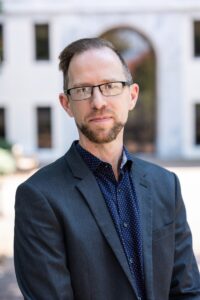This is the first post in a series of interviews conducted by the Woodruff Library with the 2023-2024 Woodruff Library and Emory Center for Digital Scholarship (ECDS) Fellows. Funded by the Laney Graduate School, the library and ECDS award fellowships to advanced graduate students expecting to complete their dissertations by the end of the fellowship period. Fellows are placed within the Woodruff Library and ECDS to work in an area related to their subject specialization or interest, culminating in a formal presentation in the spring.
David Nichols is a Latin American literary and cultural scholar specializing in mass incarceration. The areas of inquiry that shape his research are 20th and 21st century literature, race, criminalization, the erotics of state punishment, sexuality and gender, spatiality and affect, and new media technologies. His dissertation, titled ‘Prisons and Utopias in Latin America: 1960-2020,’ addresses the transit of logics in the post-dictatorship countries of Argentina, Brazil, and Chile between carceral and utopian sites in literature, film, and the real world. He completed his bachelor’s degree at the University of Kansas in Spanish and Portuguese, with a minor in Latino Studies through the American Studies department.
Tell us a little bit about yourself. Where are you from?
I am from Topeka, Kansas originally. I’ve lived in Lincoln, Nebraska, Nayarit, Mexico, and then Kansas one more time to finish my undergraduate degree. In Kansas and Nebraska, I worked in plant nurseries. I miss how open the sky felt on the Plains. Now I live in Atlanta in Grant Park, which I also love.
What’s your favorite book?
This is an impossible question! Candidates include: 1) Youth in Revolt, by CD Payne, 1) Crime and Punishment, by Dostoyevsky,
2) Macunaíma: o herói sem nenhum caráter, by Mário de Andrade, 3) Dom Casmurro, by Machado de Assis, 4) El padre mío by Diamela Eltit, 5) Hellfire: The Jerry Lee Lewis Story, 6) Pedro Páramo by Juan Rulfo, and 7) Hard-Boiled Wonderland and the End of The World by Haruki Murakami. Also, Moby Dick! I know that’s such a predictable answer (as are Crime and Punishment and Pedro Páramo), but sometimes the classics are classics for a reason. Favorite academic books are 1) Afterlives of Confinement, by Susana Draper, and 2) The Body in Pain by Elaine Scarry.
What’s your favorite thing about Emory/Atlanta?
My favorite things about Atlanta are how green the city is and the Plaza movie theater. They’ve started playing lots of old arthouse movies there and at Tara, and it’s been so much fun. Also, the food here is really good. Less favorite things are the traffic, how much all the museums cost, and so many shopping centers. Why are there so many shopping centers?? It feels like half the city is made of them.
What are you researching for your dissertation?
My broad research theme is mass incarceration in Latin America, and I approach it through literature and film. More specifically, I’m interested in the post dictatorship world in Argentina, Brazil, and Chile, and the throughlines between incarceration (and carceral space writ large) under the dictatorship and the late capitalist present. My dissertation traces poles of authority and autonomy in carceral space and investigates practices of self-determination and its restriction in those spaces. I write on Manuel Puig, Drauzio Varella, and Diamela Eltit.
What interested you about the Woodruff Library Fellowship?
Like maybe a lot of people who work in libraries, I’ve always loved them. The books, the quiet, and the lack of any commercial purpose are all attractive to me. And, as I’m interested in how bodies are ordered and their movement controlled through space, libraries are a really great counterpart to the more openly restrictive manifestations of those practices in prisons. So, I thought it would be generative to think and work in one, as well as fun. And it really has been. On days when the cube farm is quiet, I feel like a character in a Borges novel, endlessly typing away in a cathedral to human knowledge or a tomb. On days where I’m feeling poorer and the world less classical, I’m in a scene from the movie Brazil or a character in a Bolaño short story, lost in a wasteland of the commodification of knowledge. It all really helps with my writing.
What will you be working on this year for your Woodruff Library Fellowship?
I’m developing a Global Prison Studies libguide that brings together library resources on the study of prisons worldwide. It’s been a challenge, and one that has been exciting to undertake. I’m hoping to expand it in the coming semester to include a brief history of the penitentiary for each geographic area, and potentially for individual countries.

